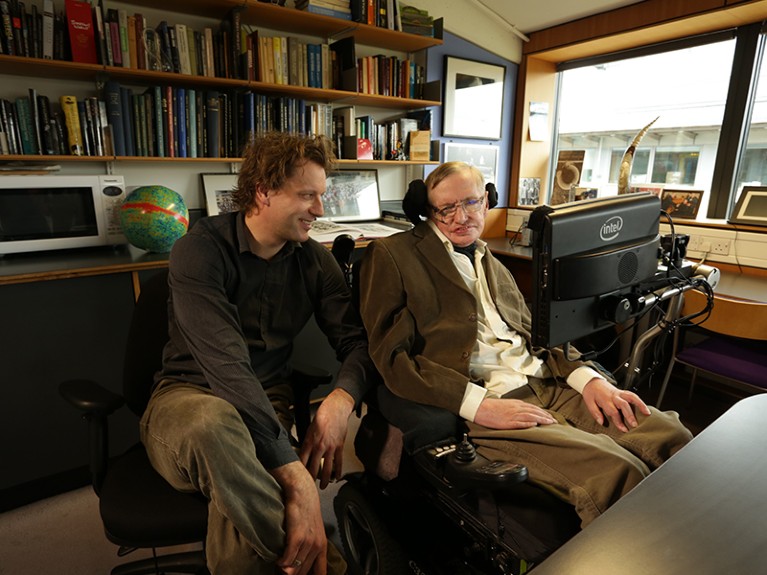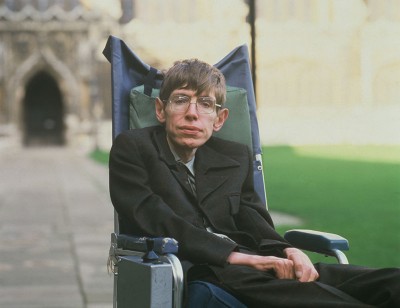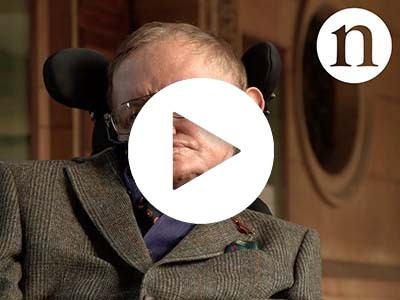
Thomas Hertog collaborated with Stephen Hawking on his final theory.Credit: Thomas Hertog and Jonathan Wood
On the Origin of Time: Stephen Hawking’s Final Theory Thomas Hertog Torva/Bantam (2023)
Stephen Hawking died five years ago, but his brand lives on. A Brief History of Time (1988) was the first of more than a dozen bestsellers by the iconic theoretical physicist. The new book On the Origin of Time — by Thomas Hertog, Hawking’s last collaborator — concerns his final theory. I can’t resist saying that it’s about time.
Hertog’s book is a fascinating tour of cosmology, the science of the Universe’s origins. The first blossoming of modern cosmology came in the 1930s, after observations led astronomers to realize that the Universe is expanding. Two explanations duelled for primacy: the ‘steady-state’ theory, which holds that the Universe is eternal, with new bits of it constantly being created to drive the expansion; and the ‘Big Bang’ theory, which says that the cosmos is stretching out from a starting point of infinitesimal size.
In the 1960s, the discovery of the cosmic microwave background, radiation that suffuses all of space and that was predicted by the Big Bang theory, seemed to settle the debate. But new controversies broke out — just as Hawking entered the fray.

Stephen Hawking (1942–2018)
In 1981, at a meeting on cosmology at the Pontifical Academy of Sciences in the Vatican, he brazenly went against a core tenet of the Big Bang theory, proposing that the Universe had no moment of creation. His suggestion sat well with other grand ideas that were being developed, such as the theory of cosmic inflation, which offered a way of ironing out some of the inconsistencies in the Big Bang picture. This theory suggested that the Universe might be part of a multiverse — one among many in a much vaster cosmos.
But Hawking revised his views. In 2016 — once again at the Pontifical Academy — he announced there might have been a moment of creation after all. Once-firmly held theories such as the multiverse now evaporated, Hertog writes, “like snow before the Sun”.
Much of On the Origin of Time describes these topics and more in mostly accessible language and metaphors. Hertog relates colourful anecdotes, such as when Hawking’s doctors allowed the ailing physicist to go to the Vatican only when they learnt he had a meeting with Pope Francis. He also recounts that, during a talk given by Hawking on inflation theory, cosmologist Andrei Linde, a founder of the field, was providing live translation into Russian — only to discover midway through that Hawking was rejecting Linde’s views.
Hidden realities
Table of Contents
It’s a long and winding road to the “final theory” of the book’s title. The closer we get, the more mathematical things become, and the farther removed from common sense. The waymarkers are now similar to the unfathomable koans used in Zen teaching, such as the idea that “once upon a time there was no time”. The final theory of the Universe is that it is ‘holographic’; a four-dimensional membrane in a five-dimensional space and a small part of a much vaster hidden reality. Hertog admits that this “may sound outrageous”.

Stephen Hawking: Three publications that shaped his career
The final theory has still more extraordinary qualities. Classical cosmologists, Hertog writes, seek a “view from nowhere” to observe the Universe unfolding as if from an abstract, exterior perspective. But the bizarre implications of quantum mechanics, in which the act of observing seems to create what is observed, make cosmologists themselves effectively the fixers of cosmic origins. “It is,” Hertog writes, “as if the act of observation today retroactively fixes the outcome of the big bang ‘back then’.” Hertog hopes that Hawking’s theory might herald “a new scientific and human worldview” that would revolutionize humanity’s “knowledge and creativity”.
The man behind the brand
On the Origin of Time has two irritating features. One is the branding. Hertog indulges in his own brand of Hawking worship, calling him “the Oracle of Delphi”, the “apostle of science”, a “miracle” and “the freest man I have known”, who had “unmatched intuition” and whose ashes were justly interred near the graves of Isaac Newton and Charles Darwin in London’s Westminster Abbey.
The gushing provides little real sense of Hawking’s character. Nor does it do justice to key people such as Jacob Bekenstein, whose work on entropy in black holes Hawking initially rejected and then adopted as central to his own theories. And the book does not provide any sense of the massive technological, institutional and bureaucratic infrastructure on which Hawking depended that is masterfully described in Hélène Mialet’s 2012 book Hawking Incorporated.
Physics versus philosophy
The second source of irritation is Hertog’s scorn for philosophy. He treats philosophers — as Hawking did during his lifetime — as rivals who think about concepts such as whether there was a Big Bang or not, and suggests that physicists love one-upping them by applying mathematical approaches to what they think are philosophical questions. But that mistakes what philosophers do. Whereas scientists study the natural world, philosophers of science study how scientists study the natural world. Hawking and Hertog’s attitude reminds me of the lament attributed to Socrates about those who think their knowledge about one thing entitles them to think they are similarly knowledgeable about many other things.
Hertog’s treatment of Hannah Arendt, one of the most important philosophers of the twentieth century, is particularly ludicrous. She and Hawking each said they are against a “view from nowhere”, which Hertog interprets as meaning that “Hannah meets Stephen”. With this, Hertog seems to urge fellow theorists to deny the classical picture that the cosmos has “a definite spacetime with a well-defined starting point and a unique evolution”. Arendt, however, criticized the theoretical and mathematical language that claims ultimate objectivity, detaches language from common sense and distances our understanding of the Universe from experience — a line of reasoning that has nothing to do with Hertog’s.
By the end of the book, I couldn’t help but recall a remark by the Soviet physicist Lev Landau — which Hertog quotes rather dismissively and without attribution — that cosmologists are “often in error but never in doubt”. The remark seems spot on. Still, disciplinary arrogance aside, On the Origin of Time lets you enjoy the cosmologists, understand their theories and realize their flaws, yet sympathize with those whose confidence will soon be demolished. The book even makes you look forward to their next ‘final’ theory.
Competing Interests
The author declares no competing interests.
